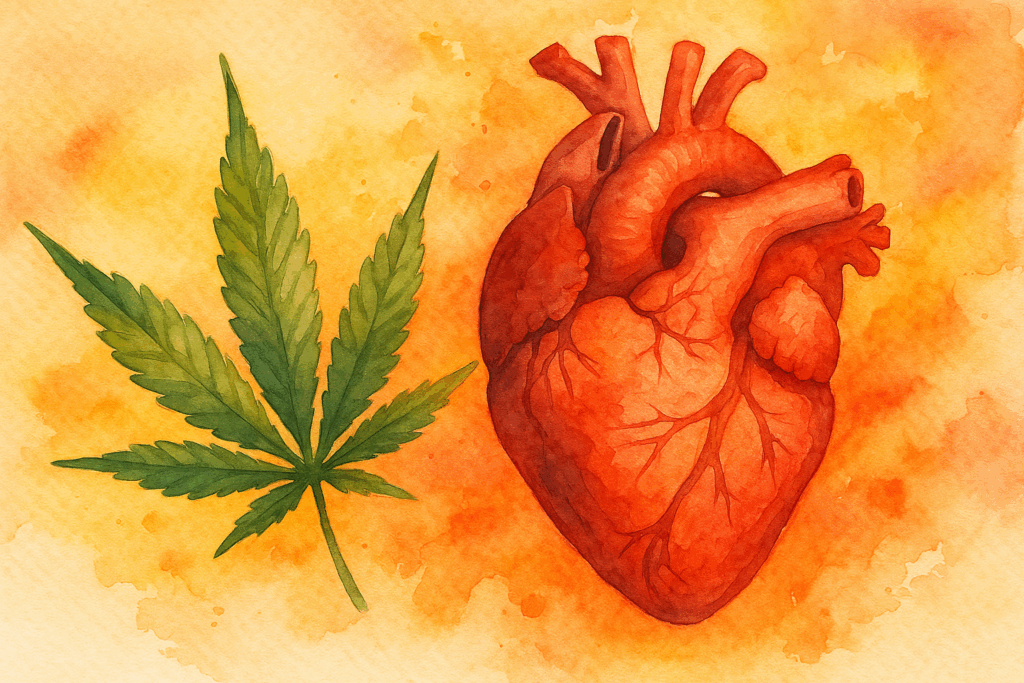Why the Cannabis–Heart Debate Is So Confusing
If you’ve ever searched “Is cannabis bad for your heart?” you’ve probably noticed the answers swing between extremes. Some headlines warn of cannabis causing heart attacks. Others claim it could be the next big heart medicine.
The truth is somewhere in between—and more complex.
One big reason for the confusion is that many studies talk about “cannabis” as if it were just one drug. In reality, cannabis is a pharmacy of hundreds of compounds. THC and CBD are the most famous, but there are dozens of other cannabinoids, plus aromatic terpenes and flavonoids, all of which can interact with the cardiovascular system differently.
So, when scientists study “cannabis” without separating out these compounds, the results can be misleading. It’s a bit like saying “all food causes weight gain” without distinguishing between broccoli and donuts.
THC and Heart Health: Benefits and Risks
Let’s start with THC, the compound best known for producing a “high.”
- At very low doses, researchers have found that THC may actually protect the heart. In animal studies, tiny amounts of THC reduced the damage caused by reduced blood flow after a heart attack. The protective effect seems linked to calming inflammation and activating survival pathways in heart tissue.
- At higher doses, the story changes. THC can cause anxiety, raise blood pressure, and speed up the heart rate. These effects are both dose- and user-dependent because THC can stimulate the two branches of the autonomic nervous system in a biphasic fashion. As a result, the experience may range from euphoric and relaxing to dysphoric, panicked, or stressful. For one person, a given dose may cause nothing more than jitters or a racing pulse. For someone with heart disease or arrhythmias, that very same dose could significantly increase the risk of serious complications.
So, THC is both a potential cardioprotective agent and a possible cardiac stressor—depending on the dose, the form, and the patient.

Is CBD Good for Heart Health?
CBD (cannabidiol) has become one of the most widely used cannabis compounds, partly because it doesn’t cause a high but often brings a gentle uplift in mood. Its relationship with heart health looks much friendlier than THC’s.
Research suggests CBD may:
- Calm inflammation that contributes to clogged arteries.
- Relax blood vessels, which support healthy blood pressure.
- Reduce scarring in heart tissue in animal studies.
Although large-scale human trials are still lacking, CBD is widely regarded as safe, and early studies suggest it is a promising heart-healthy compound.
Other Cannabis Compounds That May Protect the Heart
Cannabis is more than just THC and CBD. A handful of other compounds are showing early signs of being heart-protective:
- β-Caryophyllene (BCP): A terpene with a spicy, peppery smell that directly activates CB2 receptors. In animal studies, it reduces inflammation and protects the heart during stress.
- Cannabigerol (CBG): Sometimes called the “mother cannabinoid,” CBG has been shown to lower blood pressure in animal models and may also reduce blood clotting.
- Limonene: The citrus-scented terpene found in cannabis, oranges, and lemons has demonstrated antioxidant and anti-arrhythmic effects in lab studies.
- Cannflavins: These rare flavonoids are unique to cannabis and may help reduce platelet clumping, lowering the risk of dangerous blood clots.
It’s still early days for this research, but it reminds us that cannabis is not one molecule but a complex mixture—more like a full orchestra than a solo act.
Is Smoking Cannabis Bad for the Heart?
Even though some compounds in cannabis look protective, how cannabis is consumed makes a big difference.
Smoking or vaping delivers THC quickly, but it also exposes the body to combustion byproducts and toxins that can harm the heart and blood vessels—similar to tobacco smoke.
For people concerned about cardiovascular health, non-smoked forms like tinctures, capsules, or edibles are usually safer choices.
Practical Takeaways for People with Heart Concerns
- Cannabis is not one-size-fits-all. A CBD oil, a low-dose THC capsule, and a high-THC flower are not the same for your heart.
- Dose and context matter. Very low doses of THC may be protective, while higher doses may increase risks—especially in people with existing heart problems. Higher dose effects are impossible to predict, especially in cannabis-naïve individuals. For those who have never tried cannabis, extra caution is advised.
- CBD and other compounds look promising. Early science suggests benefits, but we need more clinical trials.
- Talk to a doctor with experience in endocannabinoid medicine. This is especially important if you already have heart disease, arrhythmias, high blood pressure, or are on heart medications.
FAQ: Cannabis and Heart Health
Does cannabis raise blood pressure?
High doses of THC can cause temporary spikes in blood pressure and heart rate. CBD and some other cannabinoids may actually lower blood pressure.
Is CBD safe for heart patients?
CBD has shown calming and anti-inflammatory effects on the cardiovascular system in early studies. It’s generally considered safe, but always talk to your doctor—especially if you take other medications.
Can cannabis prevent heart attacks?
Animal studies suggest very low-dose THC and certain terpenes may reduce heart damage after restricted blood flow. But no large human trials have proven that cannabis prevents heart attacks.
Is smoking cannabis harmful to the heart?
Yes, smoking adds toxic compounds that stress the cardiovascular system. Safer methods include oils, tinctures, or capsules.
The Bottom Line
The relationship between cannabis and heart health is not black and white. Some compounds—like low-dose THC, CBD, β-caryophyllene, CBG, and limonene—show potential as protectors of the cardiovascular system. At the same time, high-THC cannabis, especially when smoked, can increase stress on the heart and raise risks for vulnerable patients.
When it comes to cannabis and cardiovascular health, the most important questions are: Which compound? At what dose? In which person? And in what form?
Science is still unfolding the answers. Until then, the wisest approach is informed caution, careful dosing, and open dialogue with healthcare providers. And most importantly—remember that cannabis is not one medicine, but many.


